Long Winter and Summer Drought to Impact Farm Incomes in 2018

A new report, produced by Teagasc economists, highlights the likely impact on the bottom line for Irish farming resulting from this year’s peculiar weather conditions.
As part of their mid-year Outlook, Teagasc economists outlined how Irish grassland and tillage farmers have faced highly unusual weather through the first half of 2018. A long winter was followed by an abnormal spring rainfall pattern. This is turn has been followed by summer drought conditions and unusually high temperatures.
The initial impact of these weather anomalies was felt via elevated levels of winter feeding of cattle and late planting of spring sown tillage crops. This was then followed by high levels of spring rainfall, which resulted in cattle being removed from pasture and re-housed for a period. By the middle of summer, drought conditions led to a collapse in grass growth, limited grazing and an interruption to silage production.
The extent of the problem on dairy and beef farms has led to a run-down of existing stocks of silage intended for the coming winter and the diversion of silage land into grazing. Tillage farmers have found that spring sown crops have failed to mature properly, which will have a major impact on harvest yields.
Dairy farmers, who tend to operate at a considerably higher stocking rate than drystock farmers, have been badly affected, with many finding that their feed bills have doubled due to the limited availability of grass and fodder. In addition, farm milk prices were reduced in the first half of 2018, and are likely to be back about 10% on last year’s levels.
Some dairy farmers are contemplating herd size reductions as a means to limit their feed bills. Nationally, milk production, which had been set to continue to increase in 2018, is now likely to contract slightly, relative to the 2017 level.
Meanwhile, cattle finishers have also been forced to increase feed use and take actions to finish cattle early, with suckler farmers also experiencing higher feed demand.
Across the board, these difficulties have been compounded by an increase in feed prices, with fertiliser and fuel prices also up on last year’s levels.
Overall, farm income will be down substantially across all the main farm systems in 2018, with dairy farmers experiencing the largest income reductions. While much will depend on grass growing conditions over the rest of the season, it is likely that incomes on dairy farms in 2018 will typically be only half of what was achieved in 2017.
Drystock farmers, while not as badly affected as dairy farmers, will also experience an income reduction due principally to higher feed expenditure, with cattle and sheep prices for 2018 unlikely to be dramatically different relative to the 2017 level.
In spite of an expected increase in cereal prices coupled with a substantial straw price increase this year, a steep reduction in cereal yields and associated reduction in straw yields will mean that tillage farm incomes in 2018 will be down and could return to the low levels experienced in 2016.
For tillage farms the full extent of the financial impact this year will depend on weather conditions at harvest time. For dairy and drystock farms the financial impact will depend on how quickly normal grass growth is restored and the window of opportunity this creates for further silage production over the next three months, before winter conditions set in.
The full Teagasc mid-year Outlook can be viewed at –
https://www.teagasc.ie/media/website/publications/2018/Situation-and-Outlook_July-2018.pdf
























